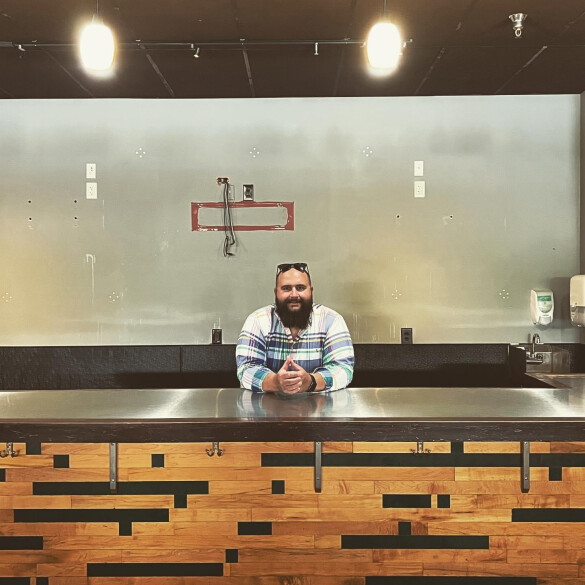
My happiest hours are spent with three or four old friends in old clothes tramping together and putting up in small pubs—or else sitting up till the small hours in someone’s college rooms talking nonsense, poetry, theology, metaphysics over beer, tea, and pipes
- C.S. Lewis
Reading that, I’m instantly transported to the Eagle and Child in St. Giles’, Oxford, that nearly mythical homebase of Lewis, J.R.R. Tolkein, and the other Inklings.
Imagine the ideas shared and the stories told over pints in some small, dark booth near the fireplace as those giants of literature and science and philosophy and theology let their minds run. For every Aslan and Bilbo, how many characters went undeveloped? How much wonder, wisdom, and knowledge never made it beyond last call? The sheer volume of material that poured from that small, dark booth is breathtaking and its impact on Western culture, especially Western Christian culture cannot be understated.
It is fair to wonder, though, if the Inklings marked the zenith of that culture. Eighty years on, who is carrying the torch? Where are the next generation of Inklings gathering? Does that place even exist?
For Jim Ranieri, Director of Missional Outreach at Redeemer Anglican Church in Raleigh, NC, those questions are crucial to Western Christian life in the 21st Century and expose two poignant gaps in Christian thought and practice.
“Human beings are by nature storytelling creatures,” Jim told me, referencing Alistair McIntyre’s seminal After Virtue, “and the fundamental question is not ‘what should I do,’ but ‘what story am I part of?’” Therein lies the first gap: a story we’ve forgotten.
“Tolkein and Lewis are so incredibly gifted and impactful,” Jim continued, “because they are both masters of that broader [Western] tradition…” Indeed, Tolkein, Lewis, and the rest of the Inklings were some of the most well-read people you could find. They were conversant not only in Christian thought, but in philosophy, literature, and science. They knew the material and they had the unique ability to weave the material together to mine its depths in deeply insightful ways.
This is the key to Jim’s understanding of the Western tradition - the story we’ve forgotten. A Christian educator and administrator for 12 years, Jim argues that the first five books of the Bible form the basis of this tradition because they introduce a God who loves us and seeks to reconcile sinners. From there, Greco-Roman literary and philosophical tradition mix in and become the “handmaiden to theology,” as Thomas Aquinas said. Those thinkers and the thinkers they influenced, then, all help us better understand who we were made to be. “By the great [tradition], I mean all human history, the great artists, poets, theologians, philosophers, and writers who have contributed their voice to this broad canon of what it means to be human; what it means to suffer. To answer, ‘why are we here?’” This is the story we’ve forgotten.
“If we are fundamentally storytelling creatures,” Jim continued, “I think our broader culture in the West has started to tell wrong stories and people have immersed themselves in them. Now, we’re sitting around as Christians asking, 'What do we do?”' It is a bit cliche, perhaps, but what we do is tell better stories.
The second gap is a matter of how and where to tell those better stories. For Jim, the answer is the same: Beow’s Books and Brews, a coffee shop and pub he is opening in Raleigh, NC, to be a gathering place for Christians and non-Christians alike to encounter that great story and its roots in the Christian faith.
During his education career, countless people have told Jim how they wish they’d had access to this great story. Several years ago, he began thinking, “Well why not? Anybody can read these books. Anybody can have a discussion… What if I had a bookstore, brew pub, coffee shop where we invite people in?” He was adamant that he isn’t an expert on coffee or beer, so he is bringing in the best the Triangle has to offer to fill those needs. “But what I can step in and do,” he said, “is try to cultivate through programming an interest in the great [tradition]... I want to provide a classical Christian education for everybody, even if they’re not Christian.” So the idea for Beow’s Books and Brews took shape.

The name Beow, of course, is taken from the character in the epic poem Beowulf. Mentioned only briefly in the second stanza, Beow is a great, but humble king sent by God to lead the people as a manifestation of God’s love and mercy. It is from this Beow that the eponymous Beowulf takes his name. Jim recognizes that it’s not the easiest name, but he sees a deep richness in the symbolism. “As Tolkein would say, Beowulf is the beginning of English literature. And we’re Anglicans… Beowulf is sort of the very beginning and so, in some ways, I feel like we need a new beginning in the West of speaking about the Christian story. Beow is a good character to represent that.”
In addition to great coffee and beer, Beow’s Books and Brews will feature a library of classics. The space will be filled with beautiful art. They’ll have weekly children’s story hour and they’ll hold monthly discussions on life’s big questions and issues. They’ll host book clubs. They even have a podcast in the works that pairs a piece of classic literature with a new beer - all in the name of reintroducing a culture to its roots, so that culture might remember who God is, who they are, and what story they are a part of.

If you’re in the Raleigh, NC area, you can find Beow’s Books and Brews at 8111 Creedmoor Road Suite 153. They are still putting the finishing touches on their space, but they hope to open in late summer 2023. Follow them @beowsbooks to stay up-to-date on their progress. You’ll want to get there right away to claim your booth and begin your contribution to this great story.
